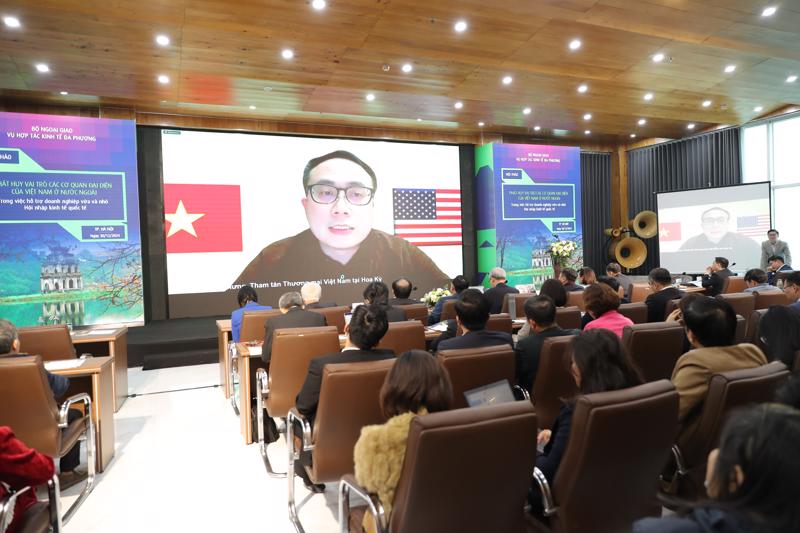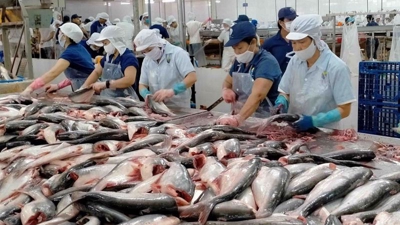Vietnamese SMEs are encouraged to penetrate into the global market
At a seminar on December 30, representatives of Vietnam trade offices abroad noted that many necessary conditions have already existed for Vietnamese businesses to expand to the global market.

As VET had earlier reported, at a seminar entitled "Enhancing the role of Vietnamese missions abroad in supporting small and medium-sized enterprises (SMEs) to participate effectively and substantively in international markets", organized by the Department of Multilateral Economic Cooperation under the Ministry of Foreign Affairs (MoFA) in Hanoi on December 30, many solutions have been identified to held Vietnamese SMEs go global more successively.
At the event, representatives of Vietnam trade offices abroad noted that many necessary conditions have already existed for Vietnamese businesses, including SMEs, to expand to the global market.
Mr. Do Ngoc Hung, Trade counselor and head of the Vietnam Trade Office in the US, shared that with Vietnam positioning itself as the US’s biggest trade partner in ASEAN and 8th overall, there have been many opportunities that lie ahead of Vietnamese business to penetrate deeper into the largest economy of the world.
According to Mr. Hung, since goods imported from Vietnam have been usually supplemental to - not a replacement for the US's domestically manufactured products, Vietnamese high quality and reasonably priced products are always welcome to the US market.
Moreover, data collected by the trade office reveals that the wholesale and retail markets in the US continue to grow, with inventory levels declining sharply in the final months of the year, including products that Vietnam excels at. In addition to offering items that align with U.S. consumer preferences, Vietnamese enterprises have been welcomed by American retailers and importers.
Mr. Hung noted that during their discussions with Vietnamese diplomatic representatives in the US, officials from major U.S. retail corporations emphasized that Vietnam is considered a long-term strategic partner.
Walmart, the world’s largest retailer, plans to collaborate with Vietnam's Ministry of Industry and Trade to host an informational event for 150–200 Vietnamese wholesalers and retailers in Q1 2025, helping them introduce products into Walmart’s distribution system and e-commerce platforms. Walmart’s annual consumption of goods imported from Vietnam is estimated at approximate $2 billion.
Beyond the U.S., Vietnamese SMEs have significant opportunities to penetrate into the South Korea market , one of the largest in Asia. According to the Vietnam Trade Office in South Korea, the country has a substantial demand for imports, valued at $500–600 billion annually. Vietnamese enterprises have yet to fully tap into this market, leaving room for growth.
Mr. Pham Khac Tuyen, Vietnamese Trade Counselor in South Korea, reported a swift recovery in Vietnam-South Korea trade following the Covid-19 pandemic. Export value from Vietnam is forecasted to reach $23.4 billion in 2024, an 8.6 per cent increase from 2023, while bilateral trade turnover is expected to hit $82 billion, up 7 per cent year-on-year.
Key Vietnamese exports, such as textiles, wood products, and seafood, largely stem from SMEs. Mr. Tuyen noted the initial promising results achieved by these businesses in penetrating into the South Korean market.
Vietnam’s free trade agreements with South Korea, both bilateral and multilateral, also provide additional advantages. Products like textiles, seafood, and woodwork benefit from high utilization rates of certificates of origin (CO), ranging from 80–90 per cent. Moreover, Vietnam’s geographic proximity to South Korea - just a four-hour flight away - facilitates regular and stable cargo flows, significantly reducing logistics costs.
Additionally, South Korean businesses, which are shifting their focus due to political tensions and setbacks, globally, increasingly view Vietnam as a potential alternative.
Though expanding internationally presents new growth opportunities, Vietnamese businesses are recommended not to overlook potential risks in pursuit of higher profits.
Mr. Tuyen emphasized that although South Korea offers a vast market, its competitive landscape is fierce, with businesses from various countries vying for a share. South Korea’s economic structure mirrors Vietnam's, with large conglomerates leading the economy and a strong SME sector accounting for about 96% of enterprises.
Additionally, firms from regions such as Central and South America are also targeting South Korea, heightening competitive pressures on Vietnamese businesses.
“Vietnamese SMEs looking to enter South Korea should be aware that this market, like other developed ones, apply stringent technical and safety standards, which are often stricter than those in the U.S. and Europe,” Mr. Tuyen highlighted. He also pointed out that Vietnamese businesses often lack insights into consumer trends and the legal framework needed for product registration and dispute resolution.
Mr. Do Ngoc Hung further warned that Vietnamese SMEs face resource challenges in addressing trade remedies imposed by many developed economies.
Vietnamese enterprises must also exercise caution when working with foreign partners. For instance, SMEs with limited resources should collaborate with Vietnamese diplomatic offices abroad to verify the legal status and financial conditions of foreign partners before proceeding with transactions.
To succeed in foreign markets, Vietnamese SMEs are encouraged to strengthen their presence on e-commerce platforms like Walmart and Amazon, maintain intermediary distribution channels, and participate in international trade fairs through programs organized by the Vietnam Chamber of Commerce and Industry (VCCI), trade promotion agencies, and major distributors both domestically and internationally.







